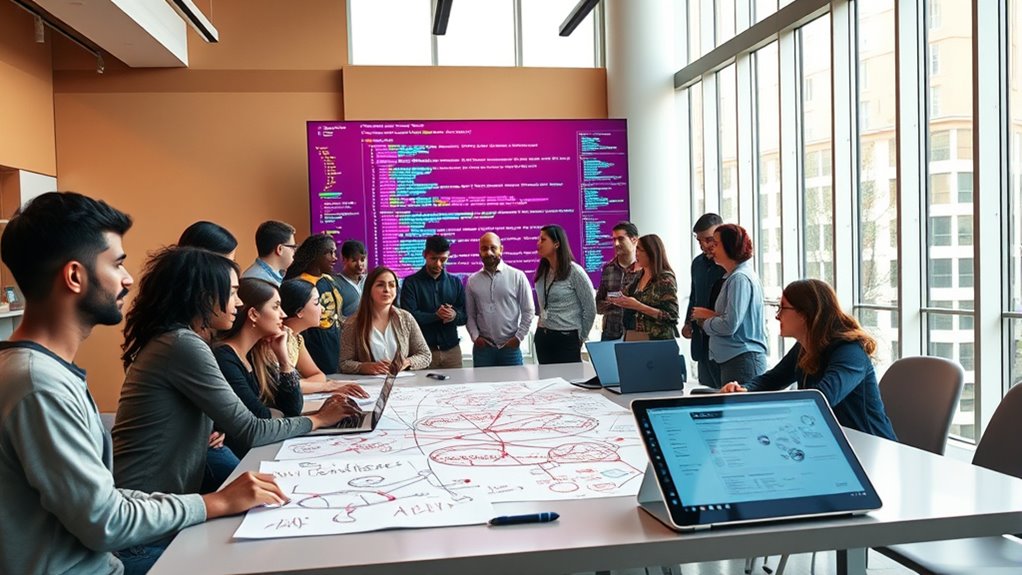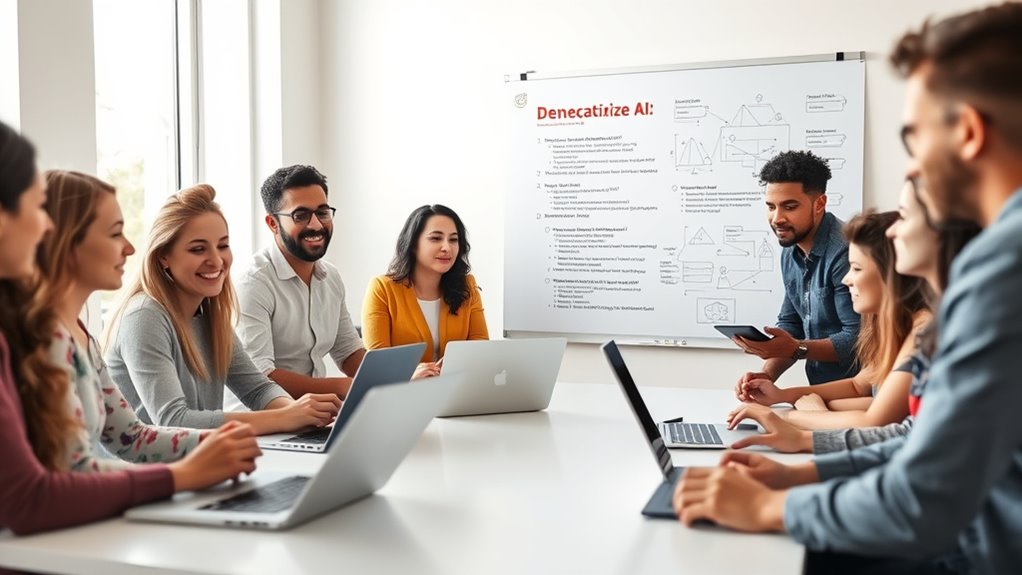Open-source AI models are democratizing access to advanced technology by removing barriers like high costs and proprietary restrictions. This empowers you to develop, customize, and deploy AI solutions globally, fostering innovation and collaboration. However, widespread availability also raises ethical concerns and technical challenges, such as potential misuse and security risks. By understanding these aspects, you’ll see how responsible open-source practices shape the future of AI’s societal impact. Keep exploring to discover more about this transformative movement.
Key Takeaways
- Open-source models make advanced AI tools accessible globally, reducing barriers like cost and proprietary restrictions.
- They foster collaboration, transparency, and customization, accelerating innovation across diverse sectors.
- Widespread access democratizes AI knowledge, empowering small organizations and individual developers.
- Ethical considerations include managing misuse risks and ensuring responsible deployment of open models.
- Ongoing community effort is essential to address technical challenges and promote responsible AI development.

Open-source models are transforming the landscape of artificial intelligence by making powerful tools accessible to everyone. This democratization allows developers, researchers, and enthusiasts worldwide to experiment, innovate, and deploy AI solutions without the barriers of expensive licenses or proprietary restrictions. However, as you embrace this open approach, it’s vital to consider the ethical implications that come with widespread access. With anyone able to modify and distribute these models, concerns about misuse, bias, and unintended consequences increase. Ensuring responsible development becomes a shared responsibility, requiring clear guidelines and ongoing oversight. You need to be vigilant about how these models are used, recognizing that open access can amplify both positive and negative impacts.
Alongside ethical considerations, technical challenges also pose significant hurdles. Open-source models often require substantial computational resources to train and fine-tune effectively, posing barriers for those lacking advanced hardware. Furthermore, the complexity of AI architectures means you may face difficulties in understanding, customizing, or troubleshooting these models without deep expertise. Maintaining model security and preventing vulnerabilities becomes essential, as malicious actors might exploit open-source tools for harmful purposes. Additionally, keeping models updated and aligned with best practices demands ongoing effort, especially when community-driven contributions may vary in quality. These technical challenges can slow down progress and create disparities between those with access to resources and knowledge versus those without. Recognizing the importance of security zone info can help mitigate some of these risks by establishing controlled environments for development and deployment.
Despite these hurdles, the benefits of open-source AI are undeniable. They foster transparency, enabling you to scrutinize how models function internally and identify potential biases or flaws. This openness encourages collaborative improvement, allowing the community to collectively address issues and push innovation forward. You gain the ability to customize models for specific needs, which is often impossible with proprietary solutions. The open nature of these models also accelerates research, leveling the playing field so smaller organizations or individuals can contribute meaningfully to the AI landscape.
However, it’s vital to approach open-source AI with a balanced perspective. While you can harness its power to drive progress and inclusivity, you must also prioritize ethical responsibility and technical diligence. By doing so, you help guarantee that the democratization of AI benefits society as a whole, minimizing risks while maximizing opportunities for innovation. Ultimately, the future of open-source models depends on your commitment to responsible development, transparent practices, and collaborative efforts to overcome challenges.
Frequently Asked Questions
How Do Open-Source Models Compare in Accuracy to Proprietary AI?
Open-source models often match proprietary AI in accuracy, especially when communities collaborate and share improvements. You’ll find that model accuracy can be very competitive, but development speed varies; open-source projects can accelerate progress due to community contributions. However, proprietary models sometimes have an edge in optimization and fine-tuning. Overall, with active community support, open-source models can be just as reliable, and you can benefit from faster development and innovation.
What Are the Main Security Risks of Open-Source AI Models?
You face security risks with open-source AI models, mainly concerning data privacy and model theft. Since the models are accessible publicly, malicious actors can exploit vulnerabilities, extract sensitive data, or steal the model itself. You need to implement strict access controls, monitor usage, and apply security best practices to protect your data and intellectual property while benefiting from open-source AI advancements.
How Can Small Organizations Effectively Implement Open-Source AI?
You can effectively implement open-source AI by engaging with community collaboration and sharing resources. Start by joining AI forums and open-source projects to learn best practices and gain support. Leverage shared datasets, models, and tools to reduce costs and accelerate development. By actively participating in these communities, you’ll stay updated on innovations, troubleshoot issues faster, and contribute back, helping democratize AI access and foster collective growth.
What Licensing Issues Exist With Open-Source AI Models?
You face licensing challenges and intellectual property concerns when using open-source AI models. Some licenses require you to give credit, share modifications, or restrict commercial use, which can limit how you deploy the model. To avoid legal issues, you need to comprehend each license’s terms thoroughly. Staying compliant ensures you respect creators’ rights and reduces the risk of lawsuits, helping you safely integrate open-source AI into your projects.
How Sustainable Is the Open-Source Model for Ongoing AI Development?
Ever wonder if open-source AI can keep thriving? It largely depends on community collaboration and funding sustainability. As communities share expertise and resources, development stays vibrant. However, consistent funding is vital to support infrastructure, research, and maintenance. Without it, progress stalls. So, while open-source AI shows promise, its long-term sustainability hinges on continuous community effort and reliable funding, making it an evolving, collective journey.
Conclusion
By embracing open-source models, you help make AI accessible to everyone. Did you know that over 80% of AI innovations today stem from open-source communities? This democratization accelerates innovation, fosters collaboration, and guarantees AI benefits are widespread. So, by supporting open-source AI, you’re not just advancing technology—you’re empowering countless individuals and organizations to create, learn, and grow together. Your involvement truly makes a difference in shaping a more inclusive AI future.










